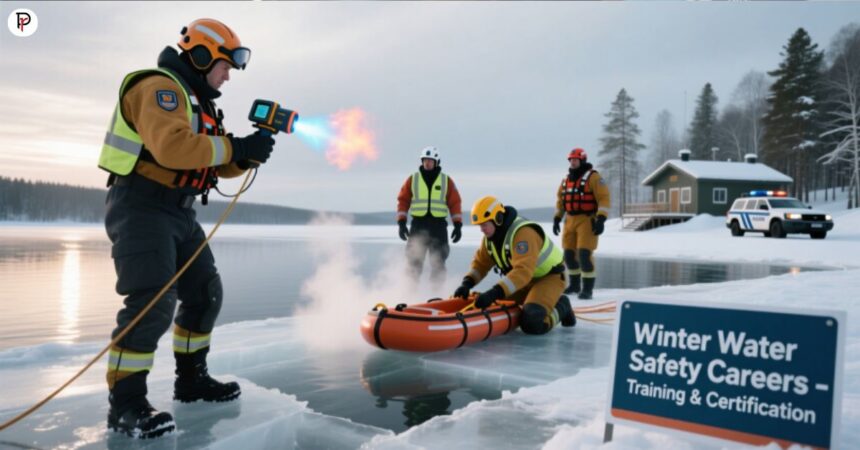Career Opportunities
For those enthusiastic about water safety throughout the colder months, winter lifeguarding offers rewarding and satisfying career opportunities. Managing cold water conditions requires specific skills and knowledge, unlike those required for summer lifeguarding. The paper examines various job paths, working environments, and growth opportunities in this field.
What is a winter lifeguard exactly?
Working as a lifeguard under frigid temperatures defines winter lifeguarding. Frozen lakes, ice rinks, and winter swimming holes are among the outdoor venues included in this category. Year-round indoor aquatic facilities may also be included. Emergency medical treatment in low temperatures and cold water rescue operations calls for winter lifeguards’ preparedness.
Why Choose Winter Lifeguarding?
There are several advantages of selecting winter lifeguarding. First of all, this is an opportunity to work in a less congested environment than summer beaches or pools. Winter environments require quick thinking and specialized skills that can be beneficial for your job. Moreover, because the work is more challenging, the pay of winter lifeguards is often quite competitive.
Required Skills for Winter Lifeguarding
Being a winter lifeguard requires specific, unique talents. Apart from excellent swimming skills, you must be competent in cold water emergency management. Saving someone from cold water is quite unlike rescuing them from warm water. In winter lifeguarding getting a survival training is necessary. Awareness of hypothermia symptoms and prompt medical action is essential.
Winter Lifeguarding Job Environments
Winter lifeguards can get work everywhere. Typical locations are frozen outdoor lakes and ice skating rinks. Of course, lifeguards also monitor winter swimming or icy water sport events. Many indoor pools also operate year-round and require lifeguards throughout the winter. These many workplace settings provide a broad spectrum of experiences.
Indoor Aquatic Amenities
Many indoor aquatic facilities stay open throughout winter. Here, employed lifeguards must ensure the safety of swimmers in the heated pool. But there are still difficulties with the cold air surrounding locker rooms and pool entrances. Frequently, these locations offer winter activities, including fitness classes and swimming lessons. Steady employment and a warm atmosphere are provided by indoor winter lifeguarding.
Certification for Winter Work by Lifeguards
Lifeguards must obtain the necessary credentials before commencing their duties. Training on CPR, first aid, and rescue methods is given in lifeguard certification courses. Extra training on cold water hazards is strongly advised for winter work. Many lifeguard certification programs now have modules on hypothermia treatment and ice rescue basics. Locating lifeguard courses close to me that offer winter-specific training will boost your employment.
Career Paths in Winter Lifeguarding
Building a winter lifeguard career can be done in several different ways. Beginning as an entry-level lifeguard is rather usual. You may then advance by getting more training and experience. Some lifeguards advance into supervisory positions, such as safety officer or head lifeguard. Others concentrate in fields such as ice rescue or emergency medical response.
Coach, Instructor, and Trainer
Seasoned winter lifeguards can turn into lifeguard trainers or instructors. These responsibilities include training new lifeguards for cold-weather service and teaching lifeguard training courses. Maintaining high safety standards and assisting others in growing their skills relies heavily on instructors. Many aquatic facilities employ trainers on a seasonal basis to run certification programs.
Emergency Medical Technician (EMT) Functions
Some winter lifeguards get additional skills by becoming paramedics or certified EMTs. This enables them to offer on-site, sophisticated medical treatment during crises. Higher-paying positions in outdoor winter rescue teams or public safety departments can be opened up with EMT certification. Combining lifeguard certification with EMT training increases your worth as a cold-weather responder.
Lifeguarding at Ski Resort and Ski Area
Some ski resorts and winter outdoor leisure locations compensate lifeguards for outdoor pools, whirlpools, or heated water elements located on their grounds. To guarantee safety during peak winter seasons, lifeguards thoroughly supervise water-based facilities. Combining outdoor winter activities with hospitality and customer service, resort employment offers a unique job choice.
Advice on Finding Winter Lifeguard Employment
Start looking for lifeguard courses near you to become certified or renew your certification if you’re interested in winter lifeguard positions. Look for outdoor activity companies, winter sports clubs, or local aquatic facilities. Connecting with other lifeguards and joining professional organizations helps you learn about job openings. Other great possibilities are seasonal job boards and regional job fairs.
Benefits of Winter Lifeguarding Careers
Winter lifeguarding exposes one to disciplines absent in summer lifeguarding. It prepares you for challenging situations and sharpens your rescue skills. Cold water lifeguards also help develop rapid decision-making and good teamwork. Lifeguards in every underwater career can profit from these abilities. Additionally, due to the challenging working conditions, winter lifeguards often form tight-knit groups.
Focus of Lifeguard training for Winter Jobs
Winter roles’ lifeguard training emphasizes the importance of handling hypothermia, cold water safety, and ice rescue skills. It also teaches lifeguards to use specialized equipment, including ice picks, rescue ropes, and thermal blankets. Many programs show how to work in layers of wet and cold gear without losing movement. If you are interested, look for “lifeguard training” programs that offer specialized winter sessions.
Preparing for winter lifeguarding duties
Get physically fit by swimming and endurance activities to get ready for winter lifeguard jobs. Thermal and waterproof gear help you dress for cold temperatures. Regularly practice rescue drills to maintain your skills under cold stress conditions. You should also investigate the impact of cold on the human body, as well as how to offer fundamental medical treatment for cold-related injuries.
Participating in Professional Lifeguard Groups
Professional group membership helps your career. Resources, seminars, and networking events are available from these groups. For instance, the American Lifeguard Association stresses training and safety for lifeguards throughout the year. They provide continuing education in advanced winter lifeguard skills, as well as basic lifeguard certification.
